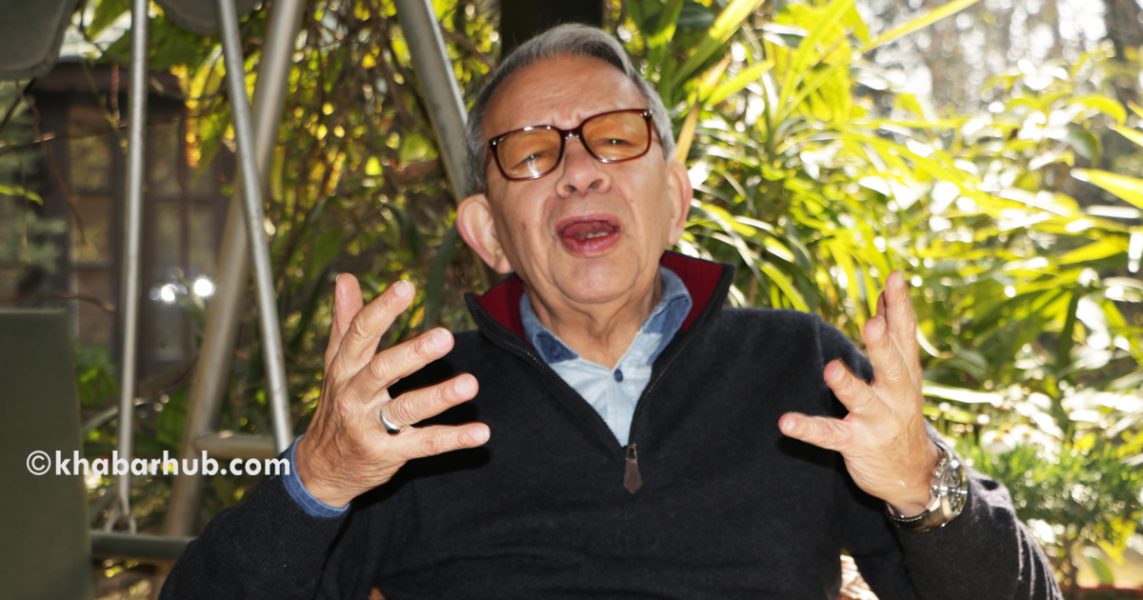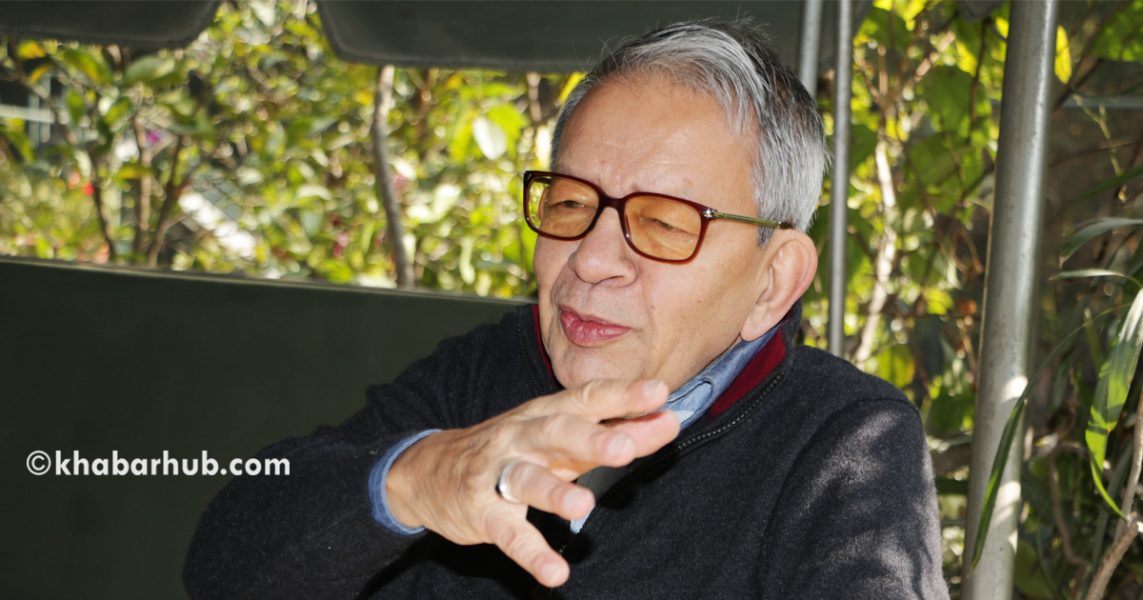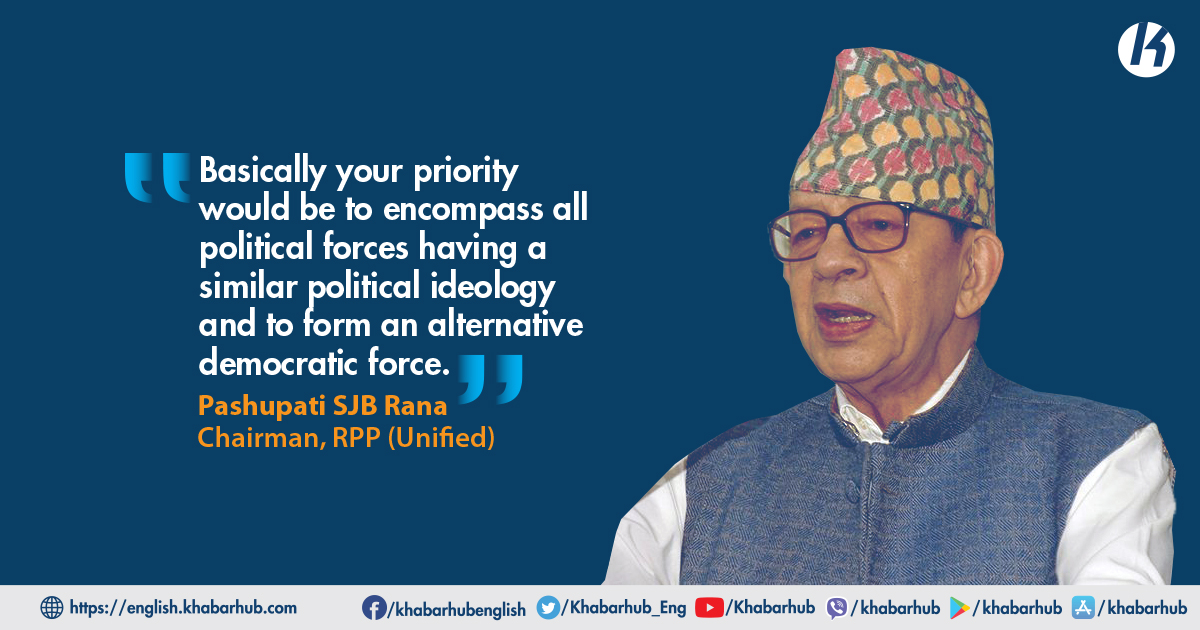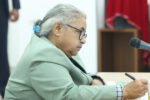Pashupati Shumsher Rana, who is well acquainted with the ins and outs of Nepal’s politics and events, talks about the purpose of an alternative force to value people’s aspirations and to protect the country’s historical, cultural and religious significance. An Oxford graduate, Rana, who is also the Chairman of newly formed Rastriya Prajatantra Party (Unified), lambasts the government of being a total failure in all aspects. He is optimistic about establishing Nepal as a Hindu state, which he argues is the need of the hour. Jibaram Bhandari and Ishwar Dev Khanal of Khabarhub caught him to ask about the need for an alternative force and his future plans. Excerpts:
The Rastriya Prajatantra Party Democratic (RPP-D) and the Rastriya Prajatantra Party Nationalist have merged to form RPP (Unified). What is the relevance of the unification?
Rana: We have merged with good will and good intentions. Basically, our priority would be to encompass all political forces having a similar political ideology and to form an alternative democratic force.
Why should people trust RPP (Unified) when there the established parties already?
Most importantly, our agenda is to establish Nepal as a Hindu state with a ceremonial monarchy as the Head of the State. There is no looking back now since 94 percent of the Nepalis are under Omkar family. The current Ceremonial Presidency practiced in Nepal has been a ‘biased’ system since the President is becoming over ambitious and extremely luxurious, which is against people’s aspirations. Therefore, I believe that people, who are frustrated with the current system, will give us a chance to become an alternative force to lead the country.

Pashupati SJB Rana in conversation with Khabarhub at his residence in Maharajgunj.
What is the element that will help your party to become an alternative force?
As I said earlier, it is basically the ideology of establishing Nepal as a Hindu state since a majority of the Nepalis come under the Omkar family. The other factor is that the Communist Party of Nepal-led government is gradually losing its credibility and people are frustrated with the government’s poor performance. RPP (Unified) can become an alternative force that the people are looking for.
Do you see any relevance of a ceremonial monarchy at this juncture of time? Isn’t this a history now?
This is in fact, the need of the hour. However, the idea is to forge a consensus with all political parties on the issue of monarchy. A ceremonial monarchy can only play the role of an unbiased center of attraction that will bind people of all communities and religions. It is high time that the country is saved from falling into the hands of hazardous elements that are hell-bent on destabilizing Nepal and its age-old culture, tradition, and religion. When Prime Minister KP Oli involves in NGO-funded religious program, tastes ‘holy wine,’ and spent millions of rupees from the state coffer, what can be more than ridiculous than this?

By saying so, won’t your party be labeled as traditional and regressive?
In fact not. Because I was the one who played a crucial role to negotiate between the king and the agitating parties in 1990. The agreement was that while the king agreed on multi-party democracy, the parties agreed to accept constitutional monarchy.
How do you evaluate the government’s 10-month-long performance?
To be precise, the government is a total fiasco. Initially, we had high hopes but it has failed in all sectors. Corruption is rampant with no efforts towards curbing it. Moreover, development activities have been ineffective. The government is becoming autocratic day by day.
Have you talked about the issue with major parties? Will they agree to it? What could be the meeting point?
First of all, the major parties should put aside their prejudices. The government has failed in all aspects. The parties can work out a common agenda of a Hindu state to protect the country’s identity.
What is your workable agenda to achieve this?
Since we are moving ahead with all good intentions, we can achieve it.
Has the merger something to do with external influence?
The demand of a Hindu state has been our demand for the past few years. There is not any external influence.
What is the basic tenet of your newly merged party?
It is based on four broad principles: nationalism, democracy, ceremonial monarchy, and a Hindu state.









Comment